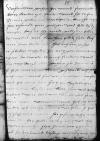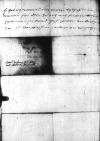Euer Bernhard von Höfen (Bernhard Flachsbinder) (†after 1548), Ioannes Dantiscus' brother, stayed with Dantiscus in Spain, as a member of his mission's retinue, and was used as a trusted courier to Poland at least from 1526; after 1530 Starost of Löbau⌊bruderBernhard von Höfen (Bernhard Flachsbinder) (†after 1548), Ioannes Dantiscus' brother, stayed with Dantiscus in Spain, as a member of his mission's retinue, and was used as a trusted courier to Poland at least from 1526; after 1530 Starost of Löbau⌋ ist heudt umb sex or fru zu mir gekomen, welcher zukunfft ich seer erfreudt pin gebesen und hedt leyd(en) mugen, das ir hy werdt gebesen, / aber dy weyl ir mit swachat pelad(en) seydt, das mir dan ladt ist, hab ich im gesagt, er sel den negsten zu euch gen Mantua (Mantova), city in northern Italy⌊MantuaMantua (Mantova), city in northern Italy⌋ reyten, da werdt er euch finden, / und sein weg auff den garten see zuneme(n).
So hadt mir mein bruder geschribe(n), ich sel euch wyderumb seer von seinetbegen grusen und pit euch, seine sach pey Charles V of Habsburg (*1500 – †1558), ruler of the Burgundian territories (1506-1555), King of Spain as Charles I (1516-1556), King of Naples and Sicily, King of the Romans (1519-1530), Holy Roman Emperor of the German Nation (elected 1519, crowned 1530, abdicated 1556); son of Philip I the Handsome and Joanna the Mad of Castile⌊keyserlicher maiestetCharles V of Habsburg (*1500 – †1558), ruler of the Burgundian territories (1506-1555), King of Spain as Charles I (1516-1556), King of Naples and Sicily, King of the Romans (1519-1530), Holy Roman Emperor of the German Nation (elected 1519, crowned 1530, abdicated 1556); son of Philip I the Handsome and Joanna the Mad of Castile⌋ lassen pefollen sein und helffe furdern, wy ir dan vom Georg Klingenbeck (Jorgen), diplomat; Commander (Hauptmann) in Klaipėda; councillor of Duke Albrecht von Hohenzollern; in the twenties ducal envoy to Scandinavia, Moscow, Livonia, Poland and Spain; 1529 - to the Diet of Speyer; 1530 - to the Diet of Augsburg; 1534 ducal envoy to Mauritius Ferber, Bishop of Ermland (HARTMANN 1525-1550, No. 322, 324; HUBATSCH 1985, p. 59)⌊ClingenpeckGeorg Klingenbeck (Jorgen), diplomat; Commander (Hauptmann) in Klaipėda; councillor of Duke Albrecht von Hohenzollern; in the twenties ducal envoy to Scandinavia, Moscow, Livonia, Poland and Spain; 1529 - to the Diet of Speyer; 1530 - to the Diet of Augsburg; 1534 ducal envoy to Mauritius Ferber, Bishop of Ermland (HARTMANN 1525-1550, No. 322, 324; HUBATSCH 1985, p. 59)⌋, so er kome(n) wyrdt, verneme(n) werdt, hab ich euch in der eyl nicht welle verhalten. So hab ich sorg, mir werden for pfingste hy nit [...] hidden by binding⌈[...][...] hidden by binding⌉rucken derhalbe ir uns noch wol hy sch hidden by binding⌈[sch]sch hidden by binding⌉reyben mecht. Seyt himit Gott pefollen.


 AAWO, AB, D.90, f. 15v
AAWO, AB, D.90, f. 15v